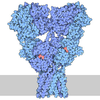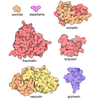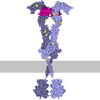[English] 日本語
 Yorodumi
Yorodumi- PDB-7sac: S-(+)-ketamine bound GluN1a-GluN2B NMDA receptors at 3.69 Angstro... -
+ Open data
Open data
- Basic information
Basic information
| Entry | Database: PDB / ID: 7sac | |||||||||||||||||||||||||||
|---|---|---|---|---|---|---|---|---|---|---|---|---|---|---|---|---|---|---|---|---|---|---|---|---|---|---|---|---|
| Title | S-(+)-ketamine bound GluN1a-GluN2B NMDA receptors at 3.69 Angstrom resolution | |||||||||||||||||||||||||||
 Components Components | (Glutamate receptor ionotropic, NMDA ...) x 2 | |||||||||||||||||||||||||||
 Keywords Keywords | TRANSPORT PROTEIN / Ligand-gated ion channel / ionotropic glutamate receptor / synaptic protein / voltage-gate ion channel | |||||||||||||||||||||||||||
| Function / homology |  Function and homology information Function and homology informationcellular response to curcumin / cellular response to corticosterone stimulus / cellular response to magnesium starvation / sensory organ development / positive regulation of Schwann cell migration / pons maturation / regulation of cell communication / sensitization / EPHB-mediated forward signaling / Assembly and cell surface presentation of NMDA receptors ...cellular response to curcumin / cellular response to corticosterone stimulus / cellular response to magnesium starvation / sensory organ development / positive regulation of Schwann cell migration / pons maturation / regulation of cell communication / sensitization / EPHB-mediated forward signaling / Assembly and cell surface presentation of NMDA receptors / response to hydrogen sulfide / auditory behavior / olfactory learning / conditioned taste aversion / dendritic branch / regulation of respiratory gaseous exchange / response to other organism / apical dendrite / regulation of ARF protein signal transduction / fear response / protein localization to postsynaptic membrane / transmitter-gated monoatomic ion channel activity / positive regulation of inhibitory postsynaptic potential / response to methylmercury / suckling behavior / response to manganese ion / response to glycine / response to carbohydrate / interleukin-1 receptor binding / propylene metabolic process / cellular response to dsRNA / cellular response to lipid / response to growth hormone / heterocyclic compound binding / negative regulation of dendritic spine maintenance / positive regulation of glutamate secretion / RAF/MAP kinase cascade / regulation of monoatomic cation transmembrane transport / NMDA glutamate receptor activity / Synaptic adhesion-like molecules / response to glycoside / voltage-gated monoatomic cation channel activity / NMDA selective glutamate receptor complex / glutamate binding / neurotransmitter receptor complex / ligand-gated sodium channel activity / response to morphine / regulation of axonogenesis / calcium ion transmembrane import into cytosol / neuromuscular process / regulation of dendrite morphogenesis / protein heterotetramerization / male mating behavior / regulation of synapse assembly / response to amine / regulation of cAMP/PKA signal transduction / glycine binding / receptor clustering / small molecule binding / startle response / parallel fiber to Purkinje cell synapse / positive regulation of reactive oxygen species biosynthetic process / monoatomic cation transmembrane transport / behavioral response to pain / regulation of MAPK cascade / positive regulation of calcium ion transport into cytosol / cellular response to glycine / extracellularly glutamate-gated ion channel activity / regulation of postsynaptic membrane potential / response to magnesium ion / action potential / associative learning / response to electrical stimulus / excitatory synapse / positive regulation of dendritic spine maintenance / monoatomic ion channel complex / social behavior / regulation of neuronal synaptic plasticity / monoatomic cation transport / glutamate receptor binding / Unblocking of NMDA receptors, glutamate binding and activation / positive regulation of excitatory postsynaptic potential / detection of mechanical stimulus involved in sensory perception of pain / long-term memory / response to mechanical stimulus / synaptic cleft / neuron development / phosphatase binding / prepulse inhibition / positive regulation of synaptic transmission, glutamatergic / multicellular organismal response to stress / postsynaptic density, intracellular component / behavioral fear response / monoatomic cation channel activity / response to fungicide / calcium ion homeostasis / glutamate-gated receptor activity / regulation of long-term synaptic depression / regulation of neuron apoptotic process / cell adhesion molecule binding Similarity search - Function | |||||||||||||||||||||||||||
| Biological species |  | |||||||||||||||||||||||||||
| Method | ELECTRON MICROSCOPY / single particle reconstruction / cryo EM / Resolution: 3.69 Å | |||||||||||||||||||||||||||
 Authors Authors | Chou, T.-H. / Furukawa, H. | |||||||||||||||||||||||||||
| Funding support |  United States, 2items United States, 2items
| |||||||||||||||||||||||||||
 Citation Citation |  Journal: Nat Struct Mol Biol / Year: 2022 Journal: Nat Struct Mol Biol / Year: 2022Title: Structural insights into binding of therapeutic channel blockers in NMDA receptors. Authors: Tsung-Han Chou / Max Epstein / Kevin Michalski / Eve Fine / Philip C Biggin / Hiro Furukawa /   Abstract: Excitatory signaling mediated by N-methyl-D-aspartate receptor (NMDAR) is critical for brain development and function, as well as for neurological diseases and disorders. Channel blockers of NMDARs ...Excitatory signaling mediated by N-methyl-D-aspartate receptor (NMDAR) is critical for brain development and function, as well as for neurological diseases and disorders. Channel blockers of NMDARs are of medical interest owing to their potential for treating depression, Alzheimer's disease, and epilepsy. However, precise mechanisms underlying binding and channel blockade have remained limited owing to challenges in obtaining high-resolution structures at the binding site within the transmembrane domains. Here, we monitor the binding of three clinically important channel blockers: phencyclidine, ketamine, and memantine in GluN1-2B NMDARs at local resolutions of 2.5-3.5 Å around the binding site using single-particle electron cryo-microscopy, molecular dynamics simulations, and electrophysiology. The channel blockers form different extents of interactions with the pore-lining residues, which control mostly off-speeds but not on-speeds. Our comparative analyses of the three unique NMDAR channel blockers provide a blueprint for developing therapeutic compounds with minimal side effects. | |||||||||||||||||||||||||||
| History |
|
- Structure visualization
Structure visualization
| Structure viewer | Molecule:  Molmil Molmil Jmol/JSmol Jmol/JSmol |
|---|
- Downloads & links
Downloads & links
- Download
Download
| PDBx/mmCIF format |  7sac.cif.gz 7sac.cif.gz | 548.2 KB | Display |  PDBx/mmCIF format PDBx/mmCIF format |
|---|---|---|---|---|
| PDB format |  pdb7sac.ent.gz pdb7sac.ent.gz | 433.6 KB | Display |  PDB format PDB format |
| PDBx/mmJSON format |  7sac.json.gz 7sac.json.gz | Tree view |  PDBx/mmJSON format PDBx/mmJSON format | |
| Others |  Other downloads Other downloads |
-Validation report
| Arichive directory |  https://data.pdbj.org/pub/pdb/validation_reports/sa/7sac https://data.pdbj.org/pub/pdb/validation_reports/sa/7sac ftp://data.pdbj.org/pub/pdb/validation_reports/sa/7sac ftp://data.pdbj.org/pub/pdb/validation_reports/sa/7sac | HTTPS FTP |
|---|
-Related structure data
| Related structure data |  24948MC 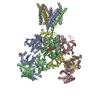 7saaC 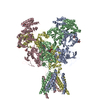 7sabC 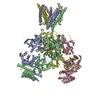 7sadC M: map data used to model this data C: citing same article ( |
|---|---|
| Similar structure data | Similarity search - Function & homology  F&H Search F&H Search |
- Links
Links
- Assembly
Assembly
| Deposited unit | 
|
|---|---|
| 1 |
|
- Components
Components
-Glutamate receptor ionotropic, NMDA ... , 2 types, 4 molecules ACBD
| #1: Protein | Mass: 95225.883 Da / Num. of mol.: 2 Source method: isolated from a genetically manipulated source Source: (gene. exp.)   #2: Protein | Mass: 98888.945 Da / Num. of mol.: 2 Source method: isolated from a genetically manipulated source Source: (gene. exp.)   |
|---|
-Sugars , 2 types, 10 molecules 
| #3: Polysaccharide | Source method: isolated from a genetically manipulated source #4: Sugar | ChemComp-NAG / |
|---|
-Non-polymers , 3 types, 5 molecules 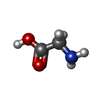
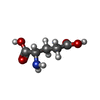
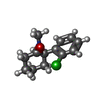


| #5: Chemical | | #6: Chemical | #7: Chemical | ChemComp-JC9 / ( | |
|---|
-Details
| Has ligand of interest | Y |
|---|---|
| Has protein modification | Y |
-Experimental details
-Experiment
| Experiment | Method: ELECTRON MICROSCOPY |
|---|---|
| EM experiment | Aggregation state: PARTICLE / 3D reconstruction method: single particle reconstruction |
- Sample preparation
Sample preparation
| Component | Name: Hetero-tetrameric GluN1a-GluN2B NMDA receptors / Type: COMPLEX / Entity ID: #1-#2 / Source: RECOMBINANT |
|---|---|
| Source (natural) | Organism:  |
| Source (recombinant) | Organism:  |
| Buffer solution | pH: 7.5 |
| Specimen | Conc.: 4 mg/ml / Embedding applied: NO / Shadowing applied: NO / Staining applied: NO / Vitrification applied: YES |
| Vitrification | Instrument: FEI VITROBOT MARK IV / Cryogen name: ETHANE / Humidity: 85 % / Chamber temperature: 285 K |
- Electron microscopy imaging
Electron microscopy imaging
| Experimental equipment |  Model: Titan Krios / Image courtesy: FEI Company |
|---|---|
| Microscopy | Model: FEI TITAN KRIOS |
| Electron gun | Electron source:  FIELD EMISSION GUN / Accelerating voltage: 300 kV / Illumination mode: FLOOD BEAM FIELD EMISSION GUN / Accelerating voltage: 300 kV / Illumination mode: FLOOD BEAM |
| Electron lens | Mode: BRIGHT FIELD |
| Image recording | Electron dose: 57.6 e/Å2 / Film or detector model: GATAN K3 BIOQUANTUM (6k x 4k) |
- Processing
Processing
| Software | Name: PHENIX / Version: 1.19.1_4122: / Classification: refinement | ||||||||||||||||||||||||
|---|---|---|---|---|---|---|---|---|---|---|---|---|---|---|---|---|---|---|---|---|---|---|---|---|---|
| EM software |
| ||||||||||||||||||||||||
| CTF correction | Type: NONE | ||||||||||||||||||||||||
| 3D reconstruction | Resolution: 3.69 Å / Resolution method: FSC 0.143 CUT-OFF / Num. of particles: 434625 / Symmetry type: POINT | ||||||||||||||||||||||||
| Refine LS restraints |
|
 Movie
Movie Controller
Controller





 PDBj
PDBj